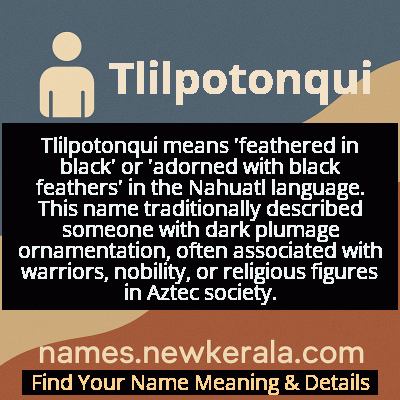Tlilpotonqui Name Meaning & Details
Origin, Popularity, Numerology Analysis & Name Meaning of Tlilpotonqui
Discover the origin, meaning, and cultural significance of the name TLILPOTONQUI. Delve into its historical roots and explore the lasting impact it has had on communities and traditions.
Name
Tlilpotonqui
Gender
Male
Origin
Nahuatl
Lucky Number
9
Meaning of the Name - Tlilpotonqui
Tlilpotonqui means 'feathered in black' or 'adorned with black feathers' in the Nahuatl language. This name traditionally described someone with dark plumage ornamentation, often associated with warriors, nobility, or religious figures in Aztec society.
Tlilpotonqui - Complete Numerology Analysis
Your Numerology Number
Based on Pythagorean Numerology System
Ruling Planet
Mars
Positive Nature
Generous, passionate, energetic, and humanitarian.
Negative Traits
Impulsive, impatient, moody, and can be overly emotional.
Lucky Colours
Red, maroon, scarlet.
Lucky Days
Tuesday.
Lucky Stones
Red coral, garnet.
Harmony Numbers
1, 2, 3, 6.
Best Suited Professions
Military, sports, philanthropy, leadership roles.
What People Like About You
Courage, energy, leadership, generosity.
Famous People Named Tlilpotonqui
Tlilpotonqui
Aztec noble and warrior
Cihuacoatl (prime minister) under Emperor Ahuitzotl, known for military leadership and administrative reforms
Tlilpotonqui
Religious leader
High priest in Tenochtitlan who maintained traditional ceremonies during Spanish contact period
Tlilpotonqui
Artisan and featherworker
Master amantecatl (featherworker) who created elaborate ceremonial garments for Aztec nobility
Name Variations & International Equivalents
Click on blue names to explore their detailed meanings. Gray names with will be available soon.
Cultural & Historical Significance
Feathers in general were highly valued in Aztec culture, with elaborate featherwork being one of the most prestigious art forms, reserved for royalty and religious ceremonies. The combination with 'black' specifically indicated a connection to Tezcatlipoca, the smoking mirror god of destiny and night, making this a name of considerable spiritual weight and social status. Historical records indicate that individuals bearing this name often held positions of authority, suggesting it was not merely descriptive but carried expectations of leadership and spiritual responsibility within the community.
Extended Personality Analysis
Individuals named Tlilpotonqui are typically perceived as possessing a mysterious and commanding presence, much like the dark feathers their name references. They often exhibit qualities of introspection, wisdom, and spiritual depth, combined with a warrior's determination and resilience. These individuals tend to be strategic thinkers who observe carefully before acting, showing patience and calculation in their decisions that often lead to successful outcomes.
Their 'black feathered' nature suggests someone who moves through life with grace and purpose, often serving as protectors or guides within their communities. They may display a dual nature - appearing reserved or even intimidating at first, but revealing profound loyalty and protective instincts toward those they value. This combination of spiritual depth and practical strength makes them natural leaders in challenging situations, capable of navigating complex social dynamics while maintaining their core principles and cultural identity.
Modern Usage & Popularity
In contemporary times, Tlilpotonqui remains a rare but culturally significant name, primarily used within Nahua communities and among families seeking to preserve indigenous Mexican heritage. The name has seen a modest revival as part of broader indigenous cultural reclamation movements, particularly among academic and activist circles focused on Mesoamerican traditions. While not appearing on mainstream baby name lists, it holds importance as a symbolic connection to pre-Columbian history and serves as an educational tool about Aztec naming conventions. Modern usage often involves parents with strong interest in indigenous linguistics and cultural preservation, making it more common in regions with active Nahuatl language revitalization programs than in general population naming trends.
Symbolic & Spiritual Meanings
Symbolically, Tlilpotonqui represents the union of earthly and spiritual realms through the metaphor of black feathers. Black in Mesoamerican symbolism often denotes the unknown, the mystical, and the transformative - much like the night that brings both rest and mystery. Feathers symbolize communication with divine realms, spiritual elevation, and the ability to traverse different planes of existence. Together, these elements create a powerful symbolic identity: someone who navigates between darkness and light, who possesses hidden wisdom, and who serves as a bridge between practical reality and spiritual understanding. The name also carries connotations of protection, as feathers were used in warrior regalia, suggesting a guardian who shields others while maintaining a connection to ancestral wisdom and cosmic order.

